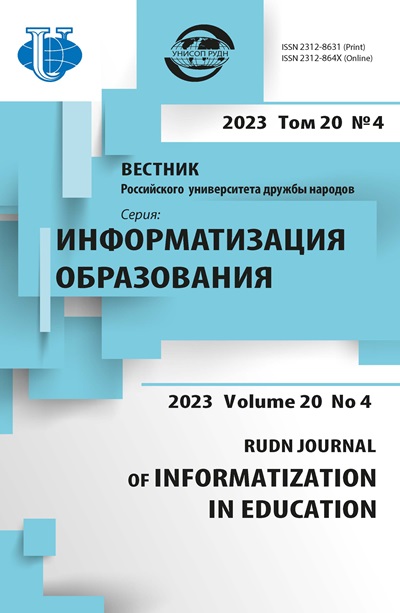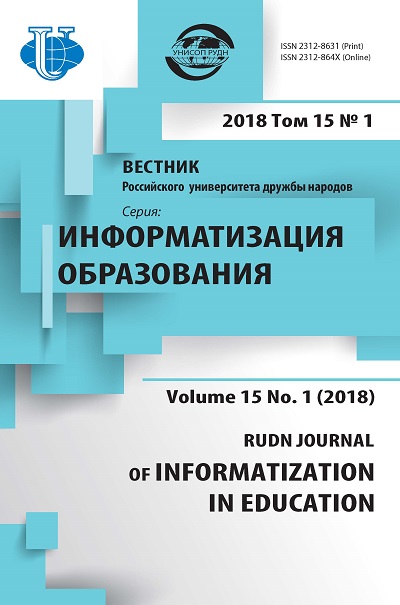Influence of network communities and transition to web 3.0 on change of approaches
- Authors: Ramazanov R.G.1, Grinshkun V.V.1
-
Affiliations:
- Moscow city pedagogical university
- Issue: Vol 15, No 1 (2018)
- Pages: 89-100
- Section: DIDUCTIC ASPECTS OF EDUCATION INFORMATIZATION
- URL: https://journals.rudn.ru/informatization-education/article/view/18056
- DOI: https://doi.org/10.22363/2312-8631-2018-15-1-89-100
Cite item
Full Text
Abstract
The article presents the genesis of network communities, the transformation of the interaction of participants in the evolution of this form of communication. The main characteristics and stages inherent in changing the formats of network interaction are described. The concept of networked communities is multifaceted and includes various processes of socialization: from the behaviour of people in interest groups to the formation of large international online communities. The evolution of such communities includes the transition from guest books and forums to more complex systems with many additional tools for networking. The introduction of modern technologies in all spheres of life leads to the formation of a qualitatively new distinctive model of education. In such conditions, the roles of participants in the educational process are changing, more attention is paid to self-education and development at the expense of the internal need for learning, the organizational and methodological component of the educational process is being reconstructed, and new conditions are created for the development of distance learning technologies. All this allows us to develop a more competitive system of interaction, make management processes transparent and create conditions for the independent development of each participant in the network space. Online network communities are a powerful tool that must be used in the education system in various interpretations, and as an additional resource that allows the principle of “lifelong learning” to be introduced into the teacher’s self-education system.
About the authors
Rinat Giniyatovich Ramazanov
Moscow city pedagogical university
Author for correspondence.
Email: r.ramazanoff@gmail.com
applicant of the chair of Informatization of education Moscow city pedagogical University
Sheremet’evskaja str., 29, Moscow, Russia, 127521Vadim Valeryevich Grinshkun
Moscow city pedagogical university
Email: vadim@grinshkun.ru
doctor of pedagogical sciences, full professor, head of the department of informatization of formation of the Moscow city pedagogical university
Sheremet’evskaja str., 29, Moscow, Russia, 127521References
- Delez Zh., Gvattari F. Rizoma. Filosofija jepohi postmoderna [Philosophy in the postmodern era]: sb. perevodov i referatov. Minsk: Krasiko-Print, 1996. Pp. 7—31.
- Grinshkun V.V., Dimov E.D. Principy otbora soderzhanija dlja obuchenija studentov vuzov tehnologijam zashhity informacii v uslovijah fundamentalizacii obrazovanija [Principles of selection of contents for teaching students the technologies of information protection in the conditions of fundamentalization of education]. Vestnik Rossijskogo universiteta druzhby narodov. Serija «Informatizacija obrazovanija» [Bulletin of the Russian university of friendship of the people. “Education Informatization” series]. 2012. No. 3. Pp. 38—45.
- Kastel’s M. Galaktika Internet: Razmyshlenija ob Internete, biznese i obshhestve [The Internet Galaxy: Reflections on Internet, business and society]. Ekaterinburg: U-Faktorija, 2004. 328 p.
- Makoveeva V.V. Setevoe vzaimodejstvie — kljuchevoj faktor razvitija integracii obrazovanija, nauki i biznesa [Network interaction — a key factor in the development of integration of education, science and business]. Vestnik Tomskogo gosudarstvennogo universiteta [Bulletin of Tomsk state University]. 2012. Pp. 163—166.
- Nazarchuk A.V. Ideja kommunikacii i novye filosofskie ponjatija XX veka [The idea of communication and new philosophical concepts of the XXth century]. Voprosy filosofii [Questions of philosophy]. 2011. No. 5. Pp. 157—165.
- Ramazanov R.G. Instrumenty setevogo vzaimodejstvija v professional’nom razvitii uchitelja [Tools of networking in the professional development of the teacher]. Vysokoe kachestvo i liderstvo v obrazovanii [High quality and leadership in education]: sbornik nauchnyh trudov mezhdunarodnoj nauchno-prakticheskoj konferencii. Astana: AOO «Nazarbaev Intellektual’nye shkoly», 2013. Pp. 350—353.
- Ramazanov R.G. www.cpm.kz — kak jeffektivnyj instrument formirovanija nezavisimogo pedagogicheskogo prostranstva [www.cpm.kz as an effective tool of formation of independent educational space]. Respublikanskaja obshhestvenno-politicheskaja gazeta «Bilim shapagaty». 2014. 26 dekabrja.
- Rostovyh D.A., Smol’nikova I.A., Poljanskaja A.V., Grinshkun V.V. i dr. Podgotovka i professional’naja dejatel’nost’ uchitelej i prepodavatelej informatiki: kompetentnostnyj podhod [Training and professional activities of teachers and computer science teachers: a competency approach]. M.: RGSU, 2010. 240 p.
- Sergeev A.N. Ispol’zovanie servisov Veb 2.0. kak sovremennyj jetap razvitija tehnologij distancionnogo obrazovanija [The use of Web 2.0 services. as the current stage of development of distance education technologies]. Izvestija Volgogradskogo gosudarstvennogo tehnicheskogo universiteta [The news of volgograd state technical university]. 2009. Vol. 10. No. 6. Pp. 151—152.
- Shirokova I.Je. Setevoe vzaimodejstvie pedagogov Irkutskoj oblasti v sisteme povyshenija kvalifikacii v mezhkursovoj period [Network interaction of teachers of the Irkutsk region in the system of training in intercourse period]. Nauchnoe obespechenie sistemy povyshenija kvalifikacii kadrov [Scientific providing for the system of advanced training]. 2012. No. 1 (10). Pp. 94—97.
- Barnes J. Class and Committees in a Norwegian Island Parish. Human Relations, 1954. Vol. 7. Pp. 39—58.
- Bourdieu P. Structures, Habitus, Practices // The Logic of Practice. Polity Press, 1990. Pp. 52—65.
- Hillery G.A. Definitions of Community: Area of Agreement // Rural Sociology. 1955. Vol. 20. No. 2. Pp. 111—123.
- Rheingol H. The Virtual Community: Homesteading on the Electronic Frontier. London: The MIT Press, Cambridge Massachusetts, 2000. 447 p.
- Tim O’Reilly. What Is Web 2.0. // Oreilly. 2005. URL: http://www.oreilly.com/pub/a/web2/ archive/what-is-web-20.html (дата обращения: 02.11.2016).
- Van Dijk J. The network society: social aspects of new media. London: Sage Publications, 2006. 304 p.
- Wellman В. Physical place and cyberplace: the rise of networked individualism // International Journal of Urban and Regional Research, 2001. Vol. 25. No. 2. Pp. 227—252.
- Williams R. Keywords. A vocabulary of culture and society. London: Helm, 1976. 286 p.
















